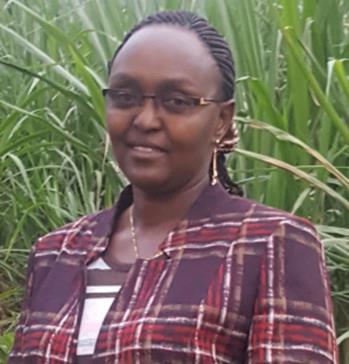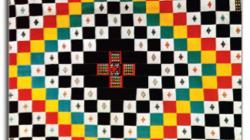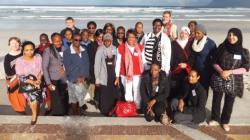
My dad provided my fees when he hardly could, did fundraising when I got university admission to do mathematics. I owe my old man all my success
Education
2012: Ph.D. Biomathematics. University of Lorraine, France.
Current position: Senior Lecturer. University of Nairobi
Work experience: Over Ten years teaching at University and more than 15 years as a midlevel college and as a high school teacher.
Questionnaire
Your story with mathematics
Can you tell us something about your story?
I am Kenyan, mother of 2 boys and one girl. I grew up in the village with little resources. I was determined to work hard and escape the biting poverty in our home. I had women, my mother’s friends who walked with me in my teenage years, so I was never wasted. I worked hard and loved mathematics all the way. When I was in class seven, my dad bought for me my first book ever called “Revision Mathematics”. I loved it so much; I did all the sums from cover to cover many times which made me do very well in my final exam. I live in Kenya and work at the university of Nairobi. I believe in girls’ education and empowerment to bridge the gender gap and I am doing my best to encourage as many girls as possible to pursue mathematics and sciences for their future careers.
Why did you join the field of Mathematics?
I found myself doing mathematics when I knew myself. I used to help the teacher in primary school solve the difficult problems on the black board when he was stuck. Now I do it as an income earner and as a hobby.
How did you discover your passion for mathematics?
I can’t really tell when exactly my passion started, but I was doing mathematics when I learnt how to read and write. I did in my primary school, in high school, in my advanced level, undergraduate, masters, PhD and I am still fascinated by the subject.
Has anyone supported you in your choice and during your career?
My dad has been very vocal about my success and love for books, so he went out of his way to protect me from preying men in the village, provided my fees when he hardly could, did fundraising when I got university admission to do mathematics and refused to give up on me, when fees were a challenge. I owe my old man all my success.
Were there any specific factors that helped you succeed?
- Determinations
- Funding from various sources
- Encouragement from my teachers
- Desire to make a better living for my family
Would you see it was easy for you to enter your field, and ultimately excel?
NO, it’s one big fight for survival and I am still fighting.
What challenges did you encounter on the way?
- Lack of academic resources
- financial strains
- Family challenges in the course of my career; my marriage broke down in the middle of my first year in masters.
Career and Family
Do you come from an academic family?
No. I am number five and was the first one to join university.
How does your family regard your career choice?
They think it’s the best for me and any other girl gifted in maths.
Is it hard to manage both career and private life? Tell us about balancing family life with work life?
Yes it is. There has been sacrifices from both ends at different times, I just make sure my family comes first, and my work second. Like if my kids need me in the evening and I have work to do, I serve them first and work when they sleep. So it’s tiring. A lot of sacrifice on your sleep and energy. It’s not easy many times it’s just by the grace of God. I delegate a lot of house work and get professional assistance when need arises like a taxi driver to pick them up from school. My relatives also come in handy when I have to travel out of town, to come and live with them in my house, and also attend school meeting in my absence.
Women and Mathematics
What were the biggest obstacles you had to overcome?
Balancing family and career, Finances have always been a challenge, so I took long to even think about starting my masters due to lack of fees, as even family basic needs were a challenge. This delays the benefits one would enjoy with an extra degree. Going to study for my doctorate, outside the country when I had to leave my kids with a nanny for three months, it’s so depressing to say the least.
Did you ever have the impression that it would be easier/harder if you were male?
Yes it’s easier for men. They carry no prregnancy and I have to cook and clean up after everybody
What kind of prejudices, if any, did you have to face?
Men supervisors favour male students.
How did that make you feel? Were you able to overcome these?
It feels deflating after all the efforts and sacrifices you have made to come this far, but, since I have a goal, I just decide to hang on and look at the sweet end, when I finally complete my course
Did you encounter any specific difficulties relating to the field of mathematics?
FEES for African girls is a big problem
Tell us about the organizations for women mathematicians that you are a part of? How has this helped your career?
AWMA, KWIMSA, AWM.
Exposure, mentorship, collaboration, referees, and workshop to share my work and meet other great women who give me mathematical company
Do you consider it necessary to organize special programs like Girl’s Day promoting mathematics for girls in schools?
Yes, I am an ambassador for maths in my country, visiting schools and telling them maths is a tool they cannot afford to ignore. I have done a one year project with the French Embassy in 2013 to mentor mathematics clubs in High school. We developed models for HIV/ AIDS with my club in my old school. Our last proposal to DREAMS Challenge in 2016 was unsuccessful. We wanted to have holiday Mathematics camps for girls, where, for 3 days, we work with talented girls from disadvantaged schools, to improve their good grades and give them early mentors to usher them into science courses at university. So, Yes the programs are very much necessary and I will support them locally and out there.
What else, do you think, could further be done to support woman with mathematics as their career?
Scholarships and holiday camps and maths clinics. Newsletters where younger girls can refer like other professional careers.
Teaching mathematics, especially to non-mathematicians, can be a challenge. What is your strategy to catch and keep the attention of your audience?
I use class participation to introduce the concepts. Most non mathematicians are way below what one can imagine. I don’t assume that they have the basic and required knowledge. Making them solve problems on the board helps me to get to their level, know what problems are there and correct the mistakes as there may not be time to look at each and every students work. I try to keep it simple and use the known to unknown introduction of the hard concepts. They need a lot of personal interaction and worked examples, so I teach halfway and then go round attending to individuals to bring the concept nearer home. I also try to go slowly so that they have time to grasp the contents.
How would you explain your research to a layman (non-specialist)?
I develop models for infectious diseases. I work on malaria for example, using equations to describe population, disease transmission, with parameters representing the various rates if changes and use the equations to predict outcomes when population or rates change in the model. Instead of using human beings to experiment, we can use symbols and see what happens as the symbols vary. These changes include proposed intervention or infections
Can you tell us about the applications of your research, if any?
Mathematical modeling is used a lot in disease control and elimination, vaccination assessment and testing of proposed strategies instead of using human subjects for the tests. The research that we do can help to predict the emergence of an epidemic, suggest control measure and suggest critical intervention times, like when to stock health facilities with relevant medicines when an outbreak is about to happen, It can also help policy makers budgeting for health department as intervention strategies with the highest effect can be derived from the model.
Conclusion
What are your biggest achievements, and what your biggest failures?
Getting my three degrees, travelling out to present my work.
Do you have a dream?
To become a professor in the next five years.
Any particular problem you dream to solve now?
How to get a postdoc out there where I can do serious and world class research and produce quality publication and results. My dream for the young girls is to break the low level of transition from one level of education to another, especially for the women in maths. Usually, we have many girls who do well in final exams, but will end up in various fields instead of mathematics. Other cases are fewer women will come back for masters in mathematics even when they were the best at graduation. Many go to professional fields like accounting and project management, so it takes too long before we get a woman proceeding to the highest level in mathematics. The other issue with transition is family life. By the end of an undergraduate, most girls are hooked for marriage, which comes with childbirth and other
commitments. So they delay coming back for masters, others have done their masters, but marry off and delay coming back for PhD, while their male counterparts, though getting married also, are able to continue with their studies. Mentorship, to help them balance family, work and studies is essential to avoid long delays which, sometimes, become a final stop for any further studies.
Which advice would you give to young girls who want to engage a career in mathematics?
Work hard, finish with academics first before getting into family life. Do the best you can and never assume that the world will have mercy on you because you are a woman! You have to fight with the men in a tilted field that always favour them. Mathematics needs consistency in follow-up of the concepts learnt, consistent revision and working out. Mathematics is easy and applicable in life. Not just in teaching but in many other careers. It is the doorway to the many science fields that girls can excel in like engineering, medicine, IT, etc. Mathematics in not for the lazy girls who want easy things in life, it is for those, who can spend many hours thinking and trying our solutions to problems, who are ready to spend hours on books looking at what they have to offer.






